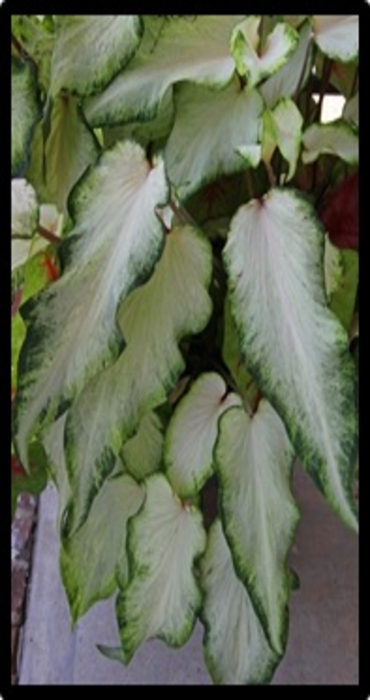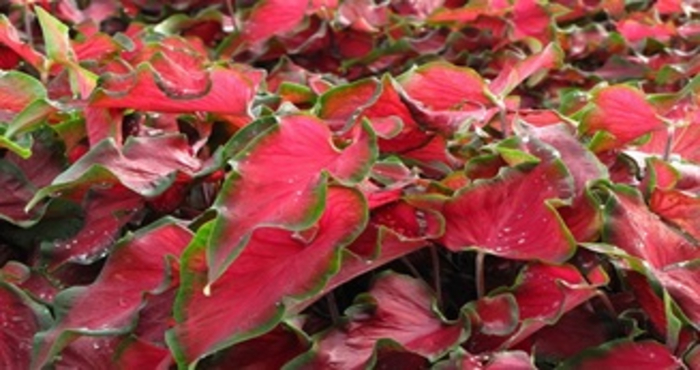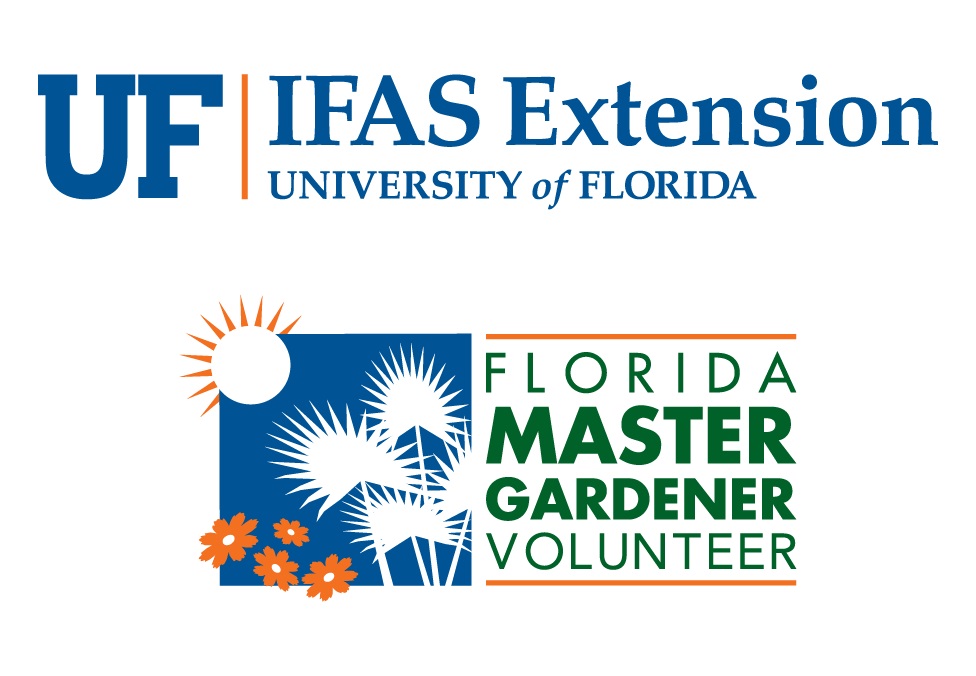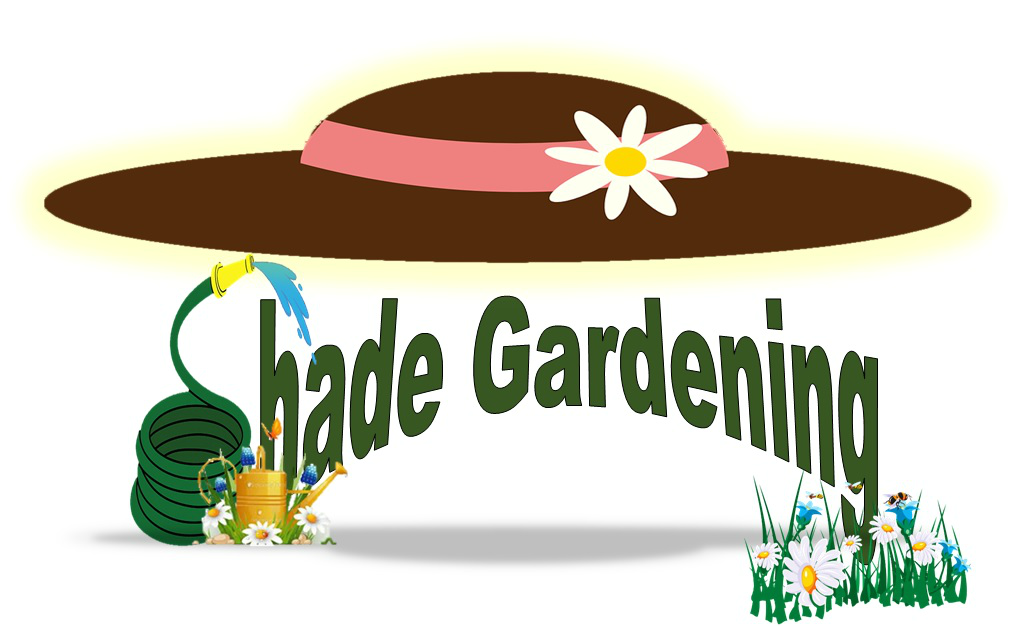Ask Master Gardener Volunteer JoAnn Green
Caladiums
Nothing brightens up the shady summer garden than the colorful caladium. Here in Wakulla County, the time to plant tubers is late March or early April. In a few months, you will be delighted to see the first leaves appearing and lasting through August. You might be able to still purchase caladium tubers in retail stores or local nurseries. If not available, there are dozens of online catalogs offering many varieties and foliage colors. Colors and combinations of colors range from white, to pink, rose, burgundy, chartreuse, and green.
A Bit About Caladiums
Caladiums were originally discovered in Brazil, along the Amazon basin. These plants do well in Florida’s warm, humid climate. While the literature states caladiums grow as perennials in Florida, here in north Florida, I found that the second year’s growth is not nearly as robust as in the first year. I consider caladiums as annual plants, and plant new tubers each spring.

There are as many different leaf types as there are colors of caladiums. Many people are familiar with the ‘elephant ear’ type leaves, but there are also fancy ruffled leaves, and long narrow leaves. They can be grown in pots or hanging baskets on your porch or patio, or in the landscape.

Several different varieties have been introduced recently that are sun tolerant.
Light Requirements
Caladiums do best in part to deep shade, averaging 2-4 hours sunlight per day. Their showy leaves can brighten up the darkest corner of the garden! I particularly like caladiums with white leaves as the white really stands out and reflects any light, even light from the full moon!
The University of Florida developed cultivars that do well in sun, so you might want to check out various publications from their website: http://edis.ifas.ufl.edu/topic_caladiums Several cultivars for the sun that are described in their publications are ‘Cosmic Delight’, ‘Fiesta’, ‘Hearts Desire’, ‘Cherry Tart’, ‘Garden White’, ‘Sizzle’, and ‘Summer Rose’. If you do try one of these sun tolerant varieties, I recommend you plant in a spot where your caladiums have late afternoon shade and not plant where they receive full sun all day. I listed four Florida growers below. Each of their websites distinguish which tubers do well in shade, sun, or both.
Soil, Water, and Fertilizer Requirements
Caladiums do best in rich, well-drained soil. While our sandy soils allow for good drainage, I recommend you incorporate compost or topsoil into the bed when  planting the tubers. The organic material will help retain moisture as these plants do need to be kept moist (not saturated). Make sure to irrigate plants if the soil becomes dry.
planting the tubers. The organic material will help retain moisture as these plants do need to be kept moist (not saturated). Make sure to irrigate plants if the soil becomes dry.
I plant my caladiums along the front sidewalk and have a soaker hose running the length of the bed. I plant them in a row in front of dark green cast iron plants. The white leaves are stunning in front of the dark backdrop. In times when we do not have rain for a few days, I will run the soaker hose for about 10 minutes to irrigate the plants. And if you purchase and plant caladiums in the sun, these may need more frequent irrigation.
Some Florida Caladium Growers I found on the internet are:
Florida Boys Caladiums, Lake Placid Florida: https://www.floridaboyscaladiums.com/thanks.asp
Caladiums Florida, Lake Placid: https://www.caladiumsflorida.com/index.html
Classic Caladiums, Avon Park, FL: https://www.classiccaladiums.com
Happiness Farms, Lake Placid: https://happinessfarms.com
When ordering from growers, be prepared to pay a little more for higher quality tubers than you might get at local box stores. I found that their prices coincide with what I would pay at one of the local nurseries. Plus, I found more of a selection online. I ordered some different bulbs to try in pots this summer. I am looking forward to see how they fit in with my standard white caladiums. I do hope you will give caladiums a try this season.
Helpful Websites
The University of Florida Gardening Solutions website has a short article about caladiums at: https://gardeningsolutions.ifas.ufl.edu/plants/ornamentals/caladiums.html
The Spruce has a little more information and detail in their article: https://www.thespruce.com/caladiums-tropical-perennials-1402836
If you have any questions or suggestions for future articles please email to wakullamg@ifas.ufl.edu
| The Institute of Food and Agricultural Sciences (IFAS) is an Equal Opportunity Institution authorized to provide research, educational information, and other services only to individuals and institutions that function with non-discrimination with respect to race, creed, color, religion, age, disability, sex, sexual orientation, marital status, national origin, political opinions, or affiliations. U.S. Department of Agriculture, Cooperative Extension Service, University of Florida, IFAS, Florida A&M University Cooperative Extension Program, and Boards of County Commissioners Cooperating |
 0
0




